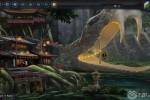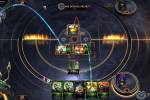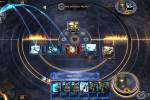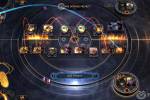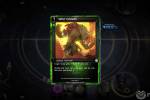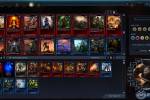The HEX experience at Gamescom
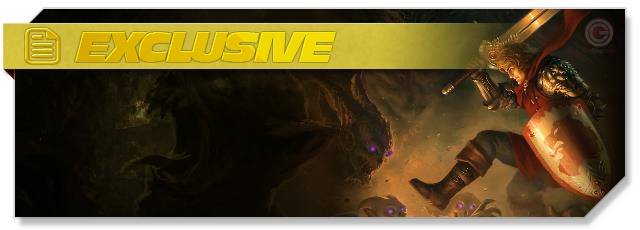
One of the meetings we were really looking forward to taking at Gamescom was for HEX: Shards of Fate, the digital Trading Card Game from Cryptozoic Entertainment, We’ve played the game already and whilst the learning curve is faaaaaar steeper than the likes of Hearthstone or, in all honesty, most digital TCGs out there, there’s so many features that are being packed into this game it’s unreal. When we walked into the room were greeted by Cory Jones, the President and Chief Creative Officer, about as high up the chain you can go whilst still being hands on with the actual game.
As soon as Cory started talking it was plain to see how pumped he was about the game, his “invention” as he referred to it numerous times, and the idea of ramming in all these MMO features to a TCG for the first time. It’s always good to talk to someone that is on the ground floor with a game, someone invested and directly involved with the development process as opposed to a PR or Community rep. The guy knew what he was talking about, he was a fan of the genre, he was a fan of games, he was a fan of his own game.
Features wise it’s going to be ram packed but the ones that they talked about (and that we’re excited for) are the Raid Dungeons that have multiple bosses with different decks that players must compete against, Guilds where players can share cards in the Guild Bank to use in battles and of course the Player Keeps. Player Keeps are a players own private treasure stash that other players can try and steal, but first they must fight through three decks that the Keeps owner has laid out for their defences. When attacking a Player Keep the attacker must pay 10% of the treasury total to attack, half of which goes to the defending player and half into the treasury itself, if a player wins they get the treasure, if they lose then the pot grows and although it’s not something that can be spent from by the owner it is a public bragging rights for how strong their defensive decks are.
The game is in constant development, the graphics and special effects are already far more polished than when we played a few months ago and it’s great to see the care and attention that is placed in the game. One of the cool little features was a slot machine that players got access to where they could try and spin to win, earning new cards, resources and more if they were successful.
When asking Cory about players comparing the game to Hearthstone he outright said that they’re not even in the same market, Hearthstone (which he is self-admittedly a huge fan of) is very much a casual TCG in comparison to the more meatier Hex. His hope is that players will enjoy Hearthstone and then when they’re ready for playing what the pro TCG players play they’ll then start looking to Hex. I commented on the complexity of the game and already they’re rolling out a more enhanced tutorial to helps players first trying the game out and from feedback making tweaks such as being able to add in automated systems that automatically switch through the phases without the player having to constantly click what is essentially a “next” button when they have nothing they can do. This was one of the main gripes they have received in testing from players, so they intend to implement sliders where players can choose how long they have to wait before the game automatically switches to the next phase/passes the turn.
When talking about other systems I touched upon Wizards of the Coast and the leading TCG Magic™ the Gathering, which Cryptozoic have recently had legal problems with, accused of copying the mechanics and systems of Magic to then use them in Hex as well as apparently copying a number of cards from the original Magic game. The question clearly was a thorn in Cory’s side and in some ways I felt bad for taking the wind out his sails, but he spoke openly and very candid about how ridiculous he found the allegations. From his point of view there’s nothing to the legal action and he’s not concerned about it, but he thinks it is overall detrimental when companies use such tactics as it is completely detrimental to the games industry in general (can we imagine if Blizzard started suing other games for using their mechanics and ideas and how many MMORPG “WoW Clones” we’d see disappear overnight?).
Other than the annoyance the problems with Wizards of the Coast haven’t seemingly had any visible effect on the community, no loss of confidence that has shown itself and the players have been nothing but supportive.
When asking about the trading and exchanging of cards, something that is huge among physical TCG collectors, we were told that the intent is to put card trading in, though certain cards (such as faction cards that can be purchased from a vendor) will be locked, as well as unique cards that are earned through some quests. One example of this was a dungeon where players must choose which side of a conflict to side with, when they complete the quest they are given a unique card for one faction or the other. Away from this players are also able to sell their cards in the Auction House, a feature that is already implemented, where players can sell their cards for in-game currency, though there are discussions in progress about the possibility of allowing players to convert their in-game currency to real world money through PayPal.
If you are interested on HEX, feel free to check out closed beta review, watch our first look video, check our comparison with Hearthstone or visit our profile by clicking on the "info" button below.
